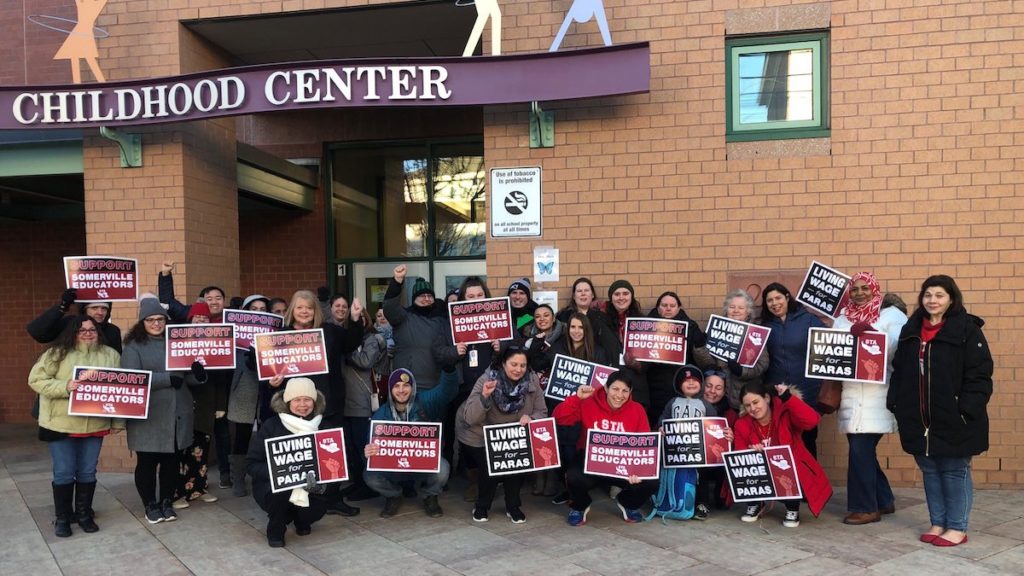The Somerville Educators Union ratified two contracts on June 15, making historic gains for both student learning conditions and educator working conditions in Somerville Public Schools.
For students this means smaller class sizes, new special education caseload caps and a social worker in every school. For educators, it means twelve weeks of paid parental leave for birth and non-birth parents, and paraprofessionals starting salaries have increased to $35,000. Both wins are firsts for any school district in the state of Massachusetts. The changes will go into effect August 31 for the new school year.
The SEU has transformed how they operate and prioritize goals in the last three years, democratically including every union member in building their bargaining platform. Bargaining Team Member and Grievance Chair Dayshawn Simmons told Liberation News, “It’s not a stretch to say every educator can look at that [bargaining] platform and see something in there that would benefit them, their students and their families.”
Rami Bridge, the current president of the SEU, explained the process. “We began with a lot of meetings in our buildings, talking to people, hearing from them what their priorities were. And very quickly it became clear that the priorities were, ‘how do we make this profession sustainable?’ Anybody who has been following education the past two years knows that it’s been really really hard and really brutal. And if someone is not saying that they’re thinking about leaving, they’re not telling you the truth.”
Students and teachers win together
More social workers in schools was one of the union’s most popular demands. According to Bridge and Simmons, the impact of the pandemic and the Summer 2020 uprisings led to increased social-emotional needs of the students upon returning to school in the fall that year. “Somerville was no exception to the national trends we saw in going back to schools,” Simmons said. “Students were more dysregulated.” At the time, the school committee added only two additional social workers across the entire district.
With the new contract, there will be at least one social worker in every Somerville Public School. “By adding those additional supports it means [teachers] are going to be in a better position to actually support their students,” said Bridge. “The way that these things trickle out we’re hoping is going to be massive and really lead to structural changes.”

Paraprofessionals were also a big focus. The salary minimum for paraprofessionals was increased to $35,000 — a 32% increase from what it is currently, and about a 75% increase from 2019’s contract negotiations.
Paraprofessionals, who are mostly women of color within SPS, function similar to teacher’s aides in other states like New York. According to Simmons, they develop the closest relationships with students, fill in the gaps where schools don’t have enough licensed teachers and fill in as substitutes when needed.
Educators and community unite
This victory took an organized effort on the part of educators to reach community members. “We started pushing on a 10% budget increase and then suddenly there was a 10% budget increase. And that doesn’t happen without educators out in the streets doing things, talking to people in the community, and then those people in the community passing things up the food chain to their local [elected officials],” said Bridge.
Although there were supporters within the SPS leadership, SPS had to be pushed to act. “The biggest challenge that we experienced this year was that for a lot of the time, school committee officials were like ‘we hear you, this is a problem, and we don’t have any money.’ Which is an old story. It’s the same one we heard in the paraprofessional contract fight,” said Bridge. “This is what municipal budgets do, they claim they don’t have money and it’s not true … They don’t want to give it to us and so part of our job is to go and make them give it to us.”
Despite the contract victory, there are still unaddressed structural issues, such as segregation within the student body and lack of diversity among the staff. “There are a lot of bigger forces at play here beyond Somerville Public Schools,” said Bridge. “Our schools are segregated because of racist housing policies and capitalism. That exists in the world, and it also exists in our schools because it is an institution that reflects the world that we live in.”
The union’s victory has highlighted the importance of struggle to members and leadership. “Now we have 750 people in our union who just saw exactly what happens when they stand up and pick a fight, and are willing to stand up for themselves and their students.”





